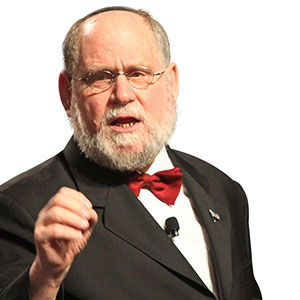
Diamond dealers still have a vital role to play in the diamond business, even if the big players don’t always recognize it, Martin Rapaport (pictured) said in a speech at the Diamond Dealers Club of New York on Monday.
“Don’t underestimate the power of dealers,” the chairman of Rapaport Corp. told a crowd at the 47th Street bourse. “Without dealers, the industry would be kaput. I don’t think we are appreciated enough by the mining companies. We have more power than we’re given credit for.”
He argued that dealers still have a role to play in the business. For one, manufacturers depend on dealers for liquidity.
“After every sight, Israeli dealers go to India and pick out goods,” Rapaport said. “If we don’t pay the manufacturers, they don’t have money to finance the next sight.”
In addition, U.S. retailers depend on dealers for consignment. “If they are successful at squeezing dealers out, there’s no more memo. And no memo, there’s no business.”
He admitted things had gotten tougher for brokers in traditional centers such as 47th Street. This is partly due to the larger trend of price competition at every level.
“You have some companies that just want to grab market share, so they can convince some idiots on Wall Street to give them money.”
This has led to “disintermediation”—cutting out middlemen.
“Everyone’s supplier is trying to sell everyone’s customer. [Overseas dealers] come into this market and try to steal our candy. Where are we in this?”
He said dealers had to rethink their role in the new world.
He gave a few areas that dealers should consider.
The estate jewelry market
This is an area that Rapaport’s company is increasingly concentrating on. Rapaport said that baby boomers have a treasure trove of jewelry that will soon need to be sold.
“Diamonds are forever. Little old ladies are not. Millions of U.S. consumers will be selling billions in jewelry in the next few years. This is stuff we can make a profit on. Why are we throwing this stuff to the pawn shop? It’s a much healthier business than praying for rough prices to go down. Everyone focuses on selling, but sometimes you can make more money buying.”
Greater social responsibility
Rapaport said that while most people in the business were honest, industry statistics show continued anomalies, like greater diamond exports from the United States than imports and a huge leap in value when goods are shipped through Dubai, United Arab Emirates.
“We have to separate New York as the most kosher market in the world. These are questions that shouldn’t be there.”
He also said the business needs to become more diverse.
“Our industry has to evolve. Where are the women in the diamond industry? Where are the millennials? We have to look like our consumers.”
Branding
“Brands are the future. If you buy from a brand, you know what you are getting. There is no watch without a brand. Five years from now, there will be no diamonds without a brand.”
He also called for rough prices to be lowered 50%, so the industry could have more breathing room.
While he acknowledged this would hurt the industry, “you can either die a slow death and watch your business be eaten alive or take a onetime hit in the face. Rough prices are too high. We need to increase profitability.”
He also continued his criticism of lab-grown diamonds, saying their prices will inevitably continue to drop.
“Right now, the profits you can make from synthetics are greater than naturals. But retailers know that synthetics are not going to hold their value. But they won’t tell customers that. When the customers come back to them in five years and want to sell them back, they are going to hide. Do we have the ethics to stand by our product in the long term, or is it just about making profits in the short term?”
(Image courtesy of Rapaport Corp.)
- Subscribe to the JCK News Daily
- Subscribe to the JCK Special Report
- Follow JCK on Instagram: @jckmagazine
- Follow JCK on X: @jckmagazine
- Follow JCK on Facebook: @jckmagazine